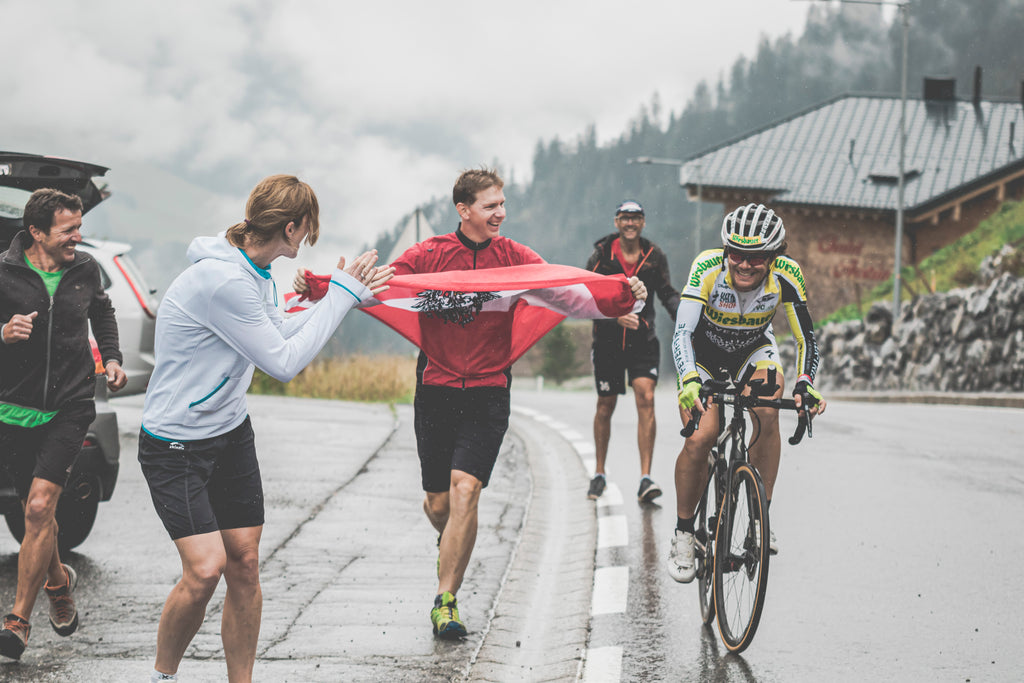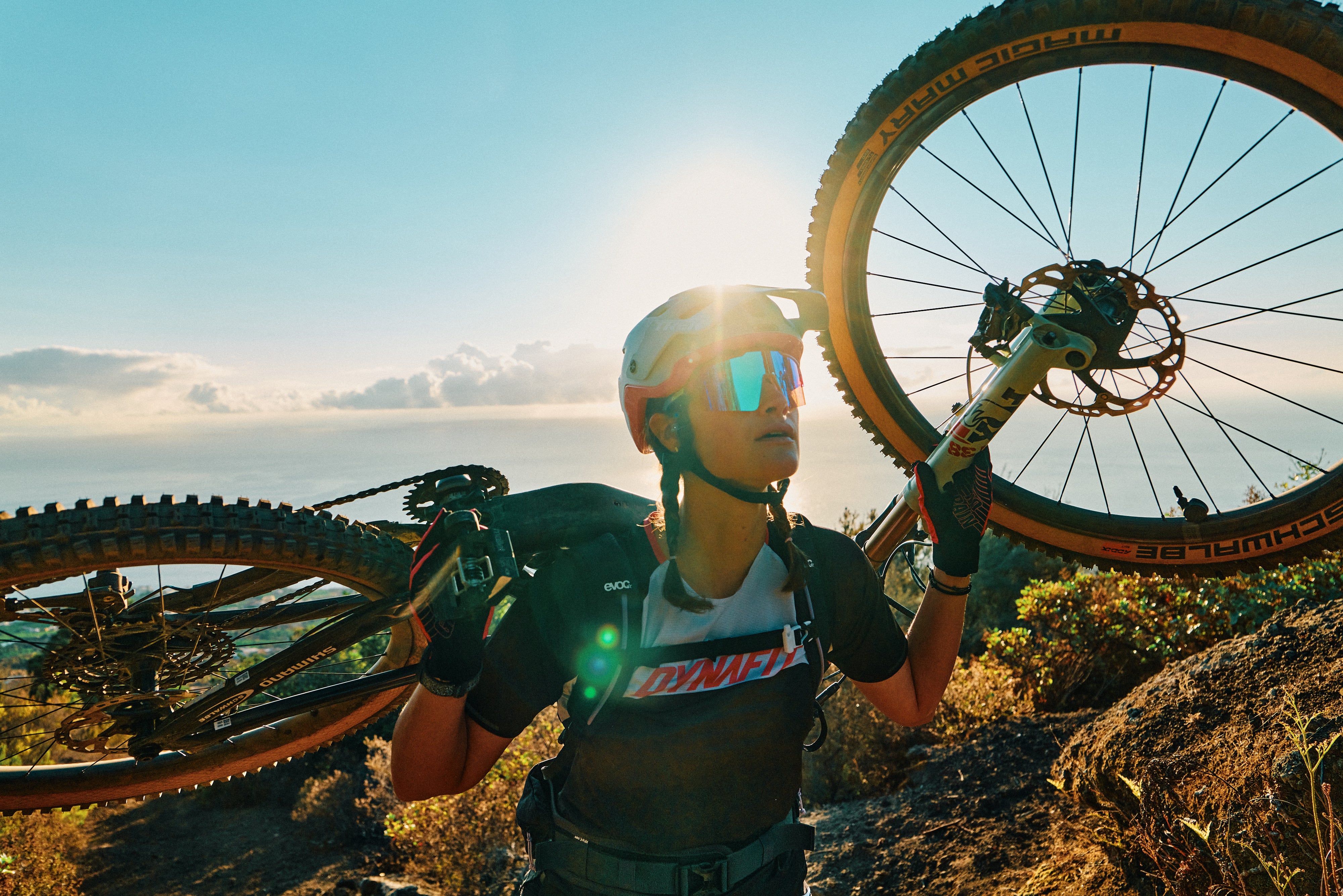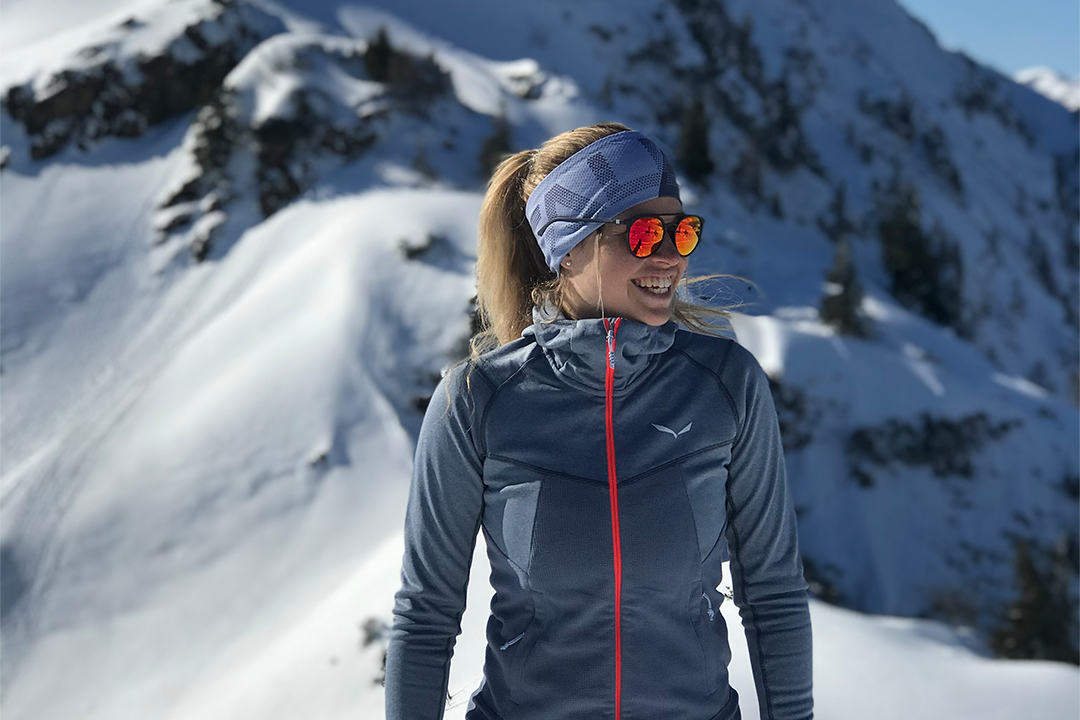Up to 5,000 kilometers across the United States, and on two wheels - what sounds to many like an unthinkably long and strenuous distance is for Christoph Strasser the site of some of his greatest sporting successes. At the "Race Across America" (RAAM), the Upper Styrian extreme athlete and J-Athlete has already won six times and he still holds the course record. However, success did not come from one day to the next.
The beginning of a passion
For a long time, Christoph had little contact with cycling. It was only at the end of his school years in the summer of 2002 that he heard about a 24-hour bike race in Upper Styria. The plan at the time: Christoph wanted to compete with friends in a four-person relay team, but shortly before the start his colleagues cancelled due to illness. However, the entry fee had already been transferred, so the then 20-year-old tried it alone. Still wearing running shoes, a T-shirt and with little training experience, Christoph did not do particularly well, but was immediately enthusiasticabout long distances and ultra-marathons on the bike.
The following year, at his second participation in the 24-hour race, Christophstood next to his great idol and 3-time RAAM winner Wolfgang Fasching at the starting line. It was through him that he finally got the ideatojoin the "Race Across America" at some point.Training then became more intensive and more and more races were on the Styrian's calendar.
Setbacks as motivation
What followed were some sporting successes, for example a world championship title in 2007. At the ultra bike marathon world championship, the "Glocknerman", Christoph was even able to set a new course record at that time and became the youngest world champion in the history of the race.
So the way to a victory in the USA seemed paved. So Christoph took part in RAAM for the first time in 2009. With his team he was there with full motivation, but had no experience with the course. About halfway through the 5,000 kilometers, Christoph had towithdraw from the racedue to pulmonary edema.A strong setback, but:
"It's also a good school of life if you don't always achieve your goals the first time."
Due to the many podium finishes in 24-hour and ultra bike races up to 1200 kilometers, Christoph was even hoping for a top-three finish at the time. The fact that he dropped out of the race came as a surprise to him, but made him think more intensively about his mistakes and prepare even better for upcoming races.
"In hindsight, I can say that failing at the first RAAM did more for me in the long run than if everything had gone off without a hitch."

Fastest time from west to east coast
The topic of RAAM was far from over for Christoph after his first participation. Just two years later, he was back on the starting line, this time better prepared for the rigors of the ultra-long race. After 8 days, 8 hours and 6 minutes, he crossed the finish line first and became the youngest winner of the race.
After his great success in the USA, it was clear to Christoph that he wanted to turn the sport, which had previously been more of a hobby, into a career. So he spent even more time training and took part in numerous races in the years that followed. In 2013, Christoph then achieved a sensation: with a riding time of 7 days, 22 hours and 11 minutes, he became the first athlete in the history of RAAM to cross the USA in less than eight days. An achievement that he was even able to beat by more than six hours in the following year.
New targets due to pandemic
In the years that followed, Christoph was able to win three more times in the USA. In 2020, however, the extreme athlete's plans were also put to the test by the worldwide COVID 19 situation. A trip to the USA was off the table. New goals were needed.
Christoph therefore wanted to break another record and become the first person to travel 1,000 kilometers in 24 hours. However, the pandemic put a spanner in the works of this plan for the time being. It was not until the following year, in Zeltweg, that the six-time RAAM winner managed to beat the then 24-hour road record of 914 kilometers. With 1,026 kilometers in 24 hours and an average of 42.75km/h, Christoph has thus fulfilled a lifelong dream.

Backing from well-rehearsed team
Christoph also has his team to thank for all his sporting successes. He does 33 percent of the work himself on the bike, his psyche is responsible for 33 percent of the success, and the remaining 34 percent can be attributed to the team, he explains.
"Even though I'm alone on the bike at the competitions, it's not an individual sport."
Especially on the ultra-long distances, the information from the trainer, the maintenance of the bike by technicians or the medical care from the team doctor are important. Christoph himself can often hardly assess whether he is still physically capable of continuing after a long stage because of the great exhaustion.
"The doctor or the team manager have to decide during the race whether I'm only suffering from expected and harmless problems, or whether it will be problematic for my health if I continue. I myself can't decide on my own after a certain point during a RAAM, because my head is no longer clear enough for that."
Since the beginning of his sporting career, the Upper Styrian has therefore relied on a well-established team that has accompanied him for some time.

Tips for beginners
Christoph recommends that all those interested in cycling simply get on their bikes and start pedaling. Especially in the beginning, you can't do much wrong. The important thing is to get a feel for the bike and find out whether you want to pursue the sport further. But if you enjoy cycling, you shouldn't overdo it right away.
You can also gain good initial experience on a cheap bike. According to the extreme athlete, investing in more expensive equipment only makes sense if you actually want to do the sport more intensively in the long term. Special attention should then be paid to three areas in particular - the saddle, the shoes and the handlebars. In other words, all the points where the body is connected to the bike.
Stylish protection for the eyes
Christoph also gives tips for the right outfit. Above all, he says, it's important to wear the right glasses. In addition to a stylish look, they also offer protection for the eyes. Christoph even compares them to wearing a helmet."You just don't wear a helmet until you fall on your head once."
The situation is similar when it comes to protecting the eyes. Dirt, wind and insects can quickly become a problem in cycling. Suitable goggles, such as those from J-Athletics, offer good protection. In addition, glasses are important for seeing well even in poor lighting conditions.





